Refine search
No keyword found to refine search
keywords EN
Places
Names
24 documents found
| 1 |
Documents per page :

Demonstration in Beirut
Bilal Tarabey / Le Pictorium
LePictorium_0217117.jpg
6th consecutive day of protest in Lebanon. In Beirut, from 5 p.m., Lebanese begin to converge on the city centre. They occupy a space between the seat of government (the palace of the -serail-) and the place of martyrs. There are no party flags, only Lebanese flags. One protester declares -since October 17 [first day of protests] we can finally say that it is the end of the civil war- The civil war in Lebanon (1975-1990) divided the country between its various religious minorities, ranging from Sunni Islam to Shiism to Catholic and Orthodox Christianity. These demonstrations mainly call for the establishment of a secular state, and an end to corruption.
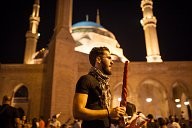
Demonstration in Beirut
Bilal Tarabey / Le Pictorium
LePictorium_0217118.jpg
6th consecutive day of protest in Lebanon. In Beirut, from 5 p.m., Lebanese begin to converge on the city centre. They occupy a space between the seat of government (the palace of the -serail-) and the place of martyrs. There are no party flags, only Lebanese flags. One protester declares -since October 17 [first day of protests] we can finally say that it is the end of the civil war- The civil war in Lebanon (1975-1990) divided the country between its various religious minorities, ranging from Sunni Islam to Shiism to Catholic and Orthodox Christianity. These demonstrations mainly call for the establishment of a secular state, and an end to corruption.
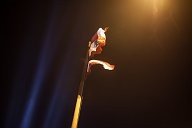
Demonstration in Beirut
Bilal Tarabey / Le Pictorium
LePictorium_0217119.jpg
6th consecutive day of protest in Lebanon. In Beirut, from 5 p.m., Lebanese begin to converge on the city centre. They occupy a space between the seat of government (the palace of the -serail-) and the place of martyrs. There are no party flags, only Lebanese flags. One protester declares -since October 17 [first day of protests] we can finally say that it is the end of the civil war- The civil war in Lebanon (1975-1990) divided the country between its various religious minorities, ranging from Sunni Islam to Shiism to Catholic and Orthodox Christianity. These demonstrations mainly call for the establishment of a secular state, and an end to corruption.
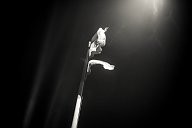
Demonstration in Beirut
Bilal Tarabey / Le Pictorium
LePictorium_0217120.jpg
6th consecutive day of protest in Lebanon. In Beirut, from 5 p.m., Lebanese begin to converge on the city centre. They occupy a space between the seat of government (the palace of the -serail-) and the place of martyrs. There are no party flags, only Lebanese flags. One protester declares -since October 17 [first day of protests] we can finally say that it is the end of the civil war- The civil war in Lebanon (1975-1990) divided the country between its various religious minorities, ranging from Sunni Islam to Shiism to Catholic and Orthodox Christianity. These demonstrations mainly call for the establishment of a secular state, and an end to corruption.
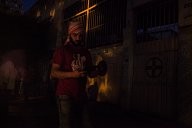
Demonstration in Beirut
Bilal Tarabey / Le Pictorium
LePictorium_0217121.jpg
6th consecutive day of protest in Lebanon. In Beirut, from 5 p.m., Lebanese begin to converge on the city centre. They occupy a space between the seat of government (the palace of the -serail-) and the place of martyrs. There are no party flags, only Lebanese flags. One protester declares -since October 17 [first day of protests] we can finally say that it is the end of the civil war- The civil war in Lebanon (1975-1990) divided the country between its various religious minorities, ranging from Sunni Islam to Shiism to Catholic and Orthodox Christianity. These demonstrations mainly call for the establishment of a secular state, and an end to corruption.
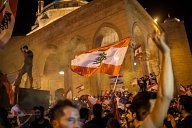
Demonstration in Beirut
Bilal Tarabey / Le Pictorium
LePictorium_0217122.jpg
6th consecutive day of protest in Lebanon. In Beirut, from 5 p.m., Lebanese begin to converge on the city centre. They occupy a space between the seat of government (the palace of the -serail-) and the place of martyrs. There are no party flags, only Lebanese flags. One protester declares -since October 17 [first day of protests] we can finally say that it is the end of the civil war- The civil war in Lebanon (1975-1990) divided the country between its various religious minorities, ranging from Sunni Islam to Shiism to Catholic and Orthodox Christianity. These demonstrations mainly call for the establishment of a secular state, and an end to corruption.
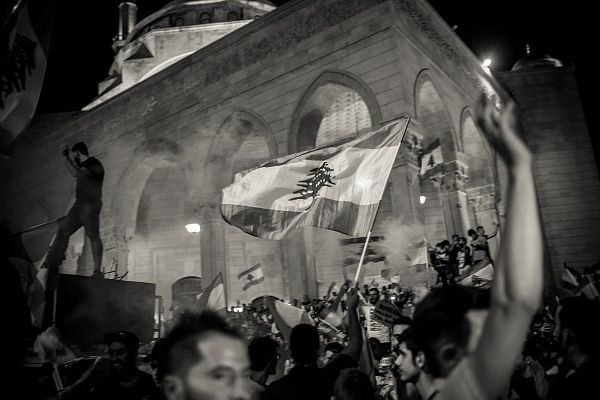
Demonstration in Beirut
Bilal Tarabey / Le Pictorium
LePictorium_0217123.jpg
6th consecutive day of protest in Lebanon. In Beirut, from 5 p.m., Lebanese begin to converge on the city centre. They occupy a space between the seat of government (the palace of the -serail-) and the place of martyrs. There are no party flags, only Lebanese flags. One protester declares -since October 17 [first day of protests] we can finally say that it is the end of the civil war- The civil war in Lebanon (1975-1990) divided the country between its various religious minorities, ranging from Sunni Islam to Shiism to Catholic and Orthodox Christianity. These demonstrations mainly call for the establishment of a secular state, and an end to corruption.
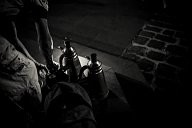
Demonstration in Beirut
Bilal Tarabey / Le Pictorium
LePictorium_0217124.jpg
6th consecutive day of protest in Lebanon. In Beirut, from 5 p.m., Lebanese begin to converge on the city centre. They occupy a space between the seat of government (the palace of the -serail-) and the place of martyrs. There are no party flags, only Lebanese flags. One protester declares -since October 17 [first day of protests] we can finally say that it is the end of the civil war- The civil war in Lebanon (1975-1990) divided the country between its various religious minorities, ranging from Sunni Islam to Shiism to Catholic and Orthodox Christianity. These demonstrations mainly call for the establishment of a secular state, and an end to corruption.
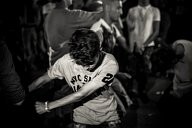
Demonstration in Beirut
Bilal Tarabey / Le Pictorium
LePictorium_0217125.jpg
6th consecutive day of protest in Lebanon. In Beirut, from 5 p.m., Lebanese begin to converge on the city centre. They occupy a space between the seat of government (the palace of the -serail-) and the place of martyrs. There are no party flags, only Lebanese flags. One protester declares -since October 17 [first day of protests] we can finally say that it is the end of the civil war- The civil war in Lebanon (1975-1990) divided the country between its various religious minorities, ranging from Sunni Islam to Shiism to Catholic and Orthodox Christianity. These demonstrations mainly call for the establishment of a secular state, and an end to corruption.
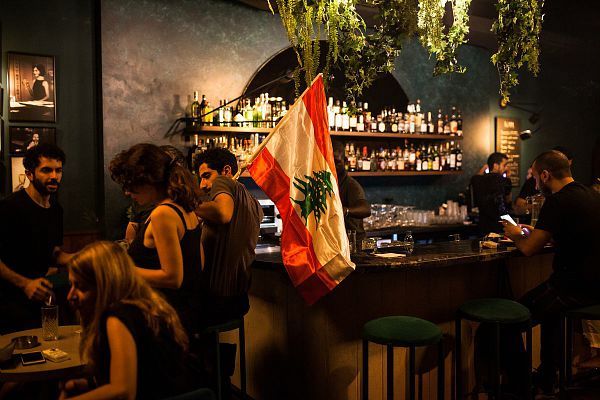
Demonstration in Beirut
Bilal Tarabey / Le Pictorium
LePictorium_0217126.jpg
6th consecutive day of protest in Lebanon. In Beirut, from 5 p.m., Lebanese begin to converge on the city centre. They occupy a space between the seat of government (the palace of the -serail-) and the place of martyrs. There are no party flags, only Lebanese flags. One protester declares -since October 17 [first day of protests] we can finally say that it is the end of the civil war- The civil war in Lebanon (1975-1990) divided the country between its various religious minorities, ranging from Sunni Islam to Shiism to Catholic and Orthodox Christianity. These demonstrations mainly call for the establishment of a secular state, and an end to corruption.
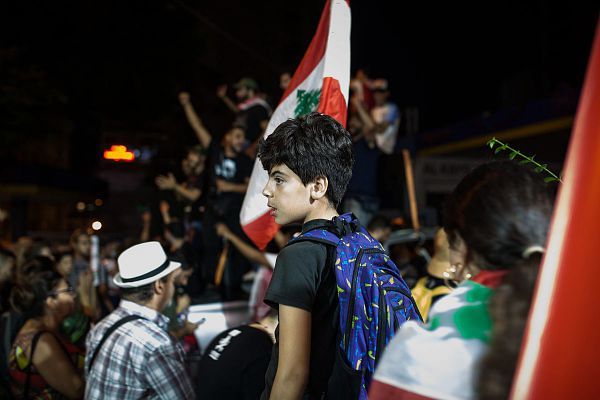
Demonstration in Beirut
Bilal Tarabey / Le Pictorium
LePictorium_0217127.jpg
6th consecutive day of protest in Lebanon. In Beirut, from 5 p.m., Lebanese begin to converge on the city centre. They occupy a space between the seat of government (the palace of the -serail-) and the place of martyrs. There are no party flags, only Lebanese flags. One protester declares -since October 17 [first day of protests] we can finally say that it is the end of the civil war- The civil war in Lebanon (1975-1990) divided the country between its various religious minorities, ranging from Sunni Islam to Shiism to Catholic and Orthodox Christianity. These demonstrations mainly call for the establishment of a secular state, and an end to corruption.
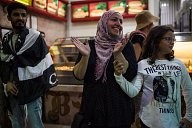
Demonstration in Beirut
Bilal Tarabey / Le Pictorium
LePictorium_0217128.jpg
6th consecutive day of protest in Lebanon. In Beirut, from 5 p.m., Lebanese begin to converge on the city centre. They occupy a space between the seat of government (the palace of the -serail-) and the place of martyrs. There are no party flags, only Lebanese flags. One protester declares -since October 17 [first day of protests] we can finally say that it is the end of the civil war- The civil war in Lebanon (1975-1990) divided the country between its various religious minorities, ranging from Sunni Islam to Shiism to Catholic and Orthodox Christianity. These demonstrations mainly call for the establishment of a secular state, and an end to corruption.
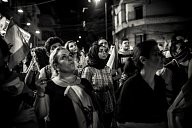
Demonstration in Beirut
Bilal Tarabey / Le Pictorium
LePictorium_0217129.jpg
6th consecutive day of protest in Lebanon. In Beirut, from 5 p.m., Lebanese begin to converge on the city centre. They occupy a space between the seat of government (the palace of the -serail-) and the place of martyrs. There are no party flags, only Lebanese flags. One protester declares -since October 17 [first day of protests] we can finally say that it is the end of the civil war- The civil war in Lebanon (1975-1990) divided the country between its various religious minorities, ranging from Sunni Islam to Shiism to Catholic and Orthodox Christianity. These demonstrations mainly call for the establishment of a secular state, and an end to corruption.
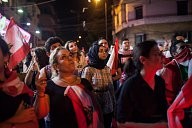
Demonstration in Beirut
Bilal Tarabey / Le Pictorium
LePictorium_0217130.jpg
6th consecutive day of protest in Lebanon. In Beirut, from 5 p.m., Lebanese begin to converge on the city centre. They occupy a space between the seat of government (the palace of the -serail-) and the place of martyrs. There are no party flags, only Lebanese flags. One protester declares -since October 17 [first day of protests] we can finally say that it is the end of the civil war- The civil war in Lebanon (1975-1990) divided the country between its various religious minorities, ranging from Sunni Islam to Shiism to Catholic and Orthodox Christianity. These demonstrations mainly call for the establishment of a secular state, and an end to corruption.
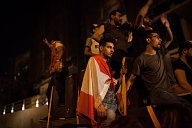
Demonstration in Beirut
Bilal Tarabey / Le Pictorium
LePictorium_0217131.jpg
6th consecutive day of protest in Lebanon. In Beirut, from 5 p.m., Lebanese begin to converge on the city centre. They occupy a space between the seat of government (the palace of the -serail-) and the place of martyrs. There are no party flags, only Lebanese flags. One protester declares -since October 17 [first day of protests] we can finally say that it is the end of the civil war- The civil war in Lebanon (1975-1990) divided the country between its various religious minorities, ranging from Sunni Islam to Shiism to Catholic and Orthodox Christianity. These demonstrations mainly call for the establishment of a secular state, and an end to corruption.
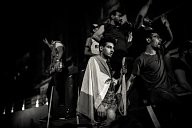
Demonstration in Beirut
Bilal Tarabey / Le Pictorium
LePictorium_0217132.jpg
6th consecutive day of protest in Lebanon. In Beirut, from 5 p.m., Lebanese begin to converge on the city centre. They occupy a space between the seat of government (the palace of the -serail-) and the place of martyrs. There are no party flags, only Lebanese flags. One protester declares -since October 17 [first day of protests] we can finally say that it is the end of the civil war- The civil war in Lebanon (1975-1990) divided the country between its various religious minorities, ranging from Sunni Islam to Shiism to Catholic and Orthodox Christianity. These demonstrations mainly call for the establishment of a secular state, and an end to corruption.
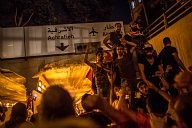
Demonstration in Beirut
Bilal Tarabey / Le Pictorium
LePictorium_0217133.jpg
6th consecutive day of protest in Lebanon. In Beirut, from 5 p.m., Lebanese begin to converge on the city centre. They occupy a space between the seat of government (the palace of the -serail-) and the place of martyrs. There are no party flags, only Lebanese flags. One protester declares -since October 17 [first day of protests] we can finally say that it is the end of the civil war- The civil war in Lebanon (1975-1990) divided the country between its various religious minorities, ranging from Sunni Islam to Shiism to Catholic and Orthodox Christianity. These demonstrations mainly call for the establishment of a secular state, and an end to corruption.
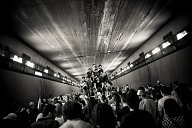
Demonstration in Beirut
Bilal Tarabey / Le Pictorium
LePictorium_0217110.jpg
6th consecutive day of protest in Lebanon. In Beirut, from 5 p.m., Lebanese begin to converge on the city centre. They occupy a space between the seat of government (the palace of the -serail-) and the place of martyrs. There are no party flags, only Lebanese flags. One protester declares -since October 17 [first day of protests] we can finally say that it is the end of the civil war- The civil war in Lebanon (1975-1990) divided the country between its various religious minorities, ranging from Sunni Islam to Shiism to Catholic and Orthodox Christianity. These demonstrations mainly call for the establishment of a secular state, and an end to corruption.
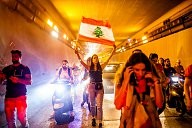
Demonstration in Beirut
Bilal Tarabey / Le Pictorium
LePictorium_0217111.jpg
6th consecutive day of protest in Lebanon. In Beirut, from 5 p.m., Lebanese begin to converge on the city centre. They occupy a space between the seat of government (the palace of the -serail-) and the place of martyrs. There are no party flags, only Lebanese flags. One protester declares -since October 17 [first day of protests] we can finally say that it is the end of the civil war- The civil war in Lebanon (1975-1990) divided the country between its various religious minorities, ranging from Sunni Islam to Shiism to Catholic and Orthodox Christianity. These demonstrations mainly call for the establishment of a secular state, and an end to corruption.
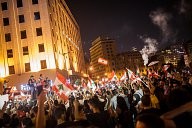
Demonstration in Beirut
Bilal Tarabey / Le Pictorium
LePictorium_0217112.jpg
6th consecutive day of protest in Lebanon. In Beirut, from 5 p.m., Lebanese begin to converge on the city centre. They occupy a space between the seat of government (the palace of the -serail-) and the place of martyrs. There are no party flags, only Lebanese flags. One protester declares -since October 17 [first day of protests] we can finally say that it is the end of the civil war- The civil war in Lebanon (1975-1990) divided the country between its various religious minorities, ranging from Sunni Islam to Shiism to Catholic and Orthodox Christianity. These demonstrations mainly call for the establishment of a secular state, and an end to corruption.

Demonstration in Beirut
Bilal Tarabey / Le Pictorium
LePictorium_0217113.jpg
6th consecutive day of protest in Lebanon. In Beirut, from 5 p.m., Lebanese begin to converge on the city centre. They occupy a space between the seat of government (the palace of the -serail-) and the place of martyrs. There are no party flags, only Lebanese flags. One protester declares -since October 17 [first day of protests] we can finally say that it is the end of the civil war- The civil war in Lebanon (1975-1990) divided the country between its various religious minorities, ranging from Sunni Islam to Shiism to Catholic and Orthodox Christianity. These demonstrations mainly call for the establishment of a secular state, and an end to corruption.
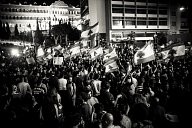
Demonstration in Beirut
Bilal Tarabey / Le Pictorium
LePictorium_0217114.jpg
6th consecutive day of protest in Lebanon. In Beirut, from 5 p.m., Lebanese begin to converge on the city centre. They occupy a space between the seat of government (the palace of the -serail-) and the place of martyrs. There are no party flags, only Lebanese flags. One protester declares -since October 17 [first day of protests] we can finally say that it is the end of the civil war- The civil war in Lebanon (1975-1990) divided the country between its various religious minorities, ranging from Sunni Islam to Shiism to Catholic and Orthodox Christianity. These demonstrations mainly call for the establishment of a secular state, and an end to corruption.
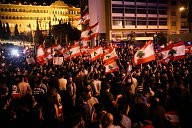
Demonstration in Beirut
Bilal Tarabey / Le Pictorium
LePictorium_0217115.jpg
6th consecutive day of protest in Lebanon. In Beirut, from 5 p.m., Lebanese begin to converge on the city centre. They occupy a space between the seat of government (the palace of the -serail-) and the place of martyrs. There are no party flags, only Lebanese flags. One protester declares -since October 17 [first day of protests] we can finally say that it is the end of the civil war- The civil war in Lebanon (1975-1990) divided the country between its various religious minorities, ranging from Sunni Islam to Shiism to Catholic and Orthodox Christianity. These demonstrations mainly call for the establishment of a secular state, and an end to corruption.
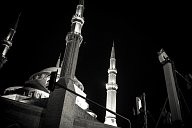
Demonstration in Beirut
Bilal Tarabey / Le Pictorium
LePictorium_0217116.jpg
6th consecutive day of protest in Lebanon. In Beirut, from 5 p.m., Lebanese begin to converge on the city centre. They occupy a space between the seat of government (the palace of the -serail-) and the place of martyrs. There are no party flags, only Lebanese flags. One protester declares -since October 17 [first day of protests] we can finally say that it is the end of the civil war- The civil war in Lebanon (1975-1990) divided the country between its various religious minorities, ranging from Sunni Islam to Shiism to Catholic and Orthodox Christianity. These demonstrations mainly call for the establishment of a secular state, and an end to corruption.

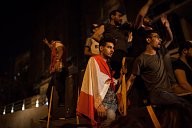 Demonstration in Beirut / Bilal Tarabey
Demonstration in Beirut / Bilal Tarabey